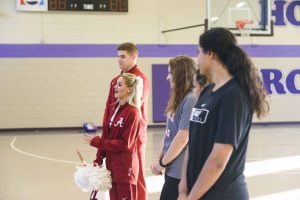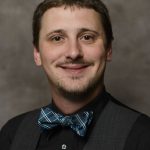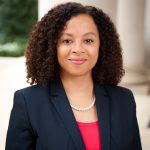
“When do you wake up? Where are you from?”
“How many games do you play a week? Can you turn a cartwheel?”
“Do you have homework? Do you have lots of homework?”
When students in Holt Elementary School’s afterschool program had the chance to ask questions of visiting UA athletes and cheerleaders, they didn’t waste it.
Rower Dani Mazer, cheerleaders Millery Null and Ben Ingallina, volleyball player Brittany Thomas and gymnast Katie Bailey stood on the gym floor fielding questions as adults in the bleachers gently guided the exchange. A child that rattled off questions was told, “You ask really good questions. I’m glad you are so interested.” Lots of homework was the springboard for talking about doing what’s important.
And that, really, was the point of the visit to TOPS, a program for K-5th graders that local nonprofit Tuscaloosa’s One Place runs at several area schools. Each TOP program offers academic enrichment, homework help, snacks and fun educational activities. The Holt program is unique, however, because it is in a two-year project with professors from UA’s College of Education.

The adults in the bleachers were pre-service teachers from the department of kinesiology. Three days a week they provide what principal investigator Dr. Michael Lawson calls sports-based youth development focusing on healthy life habits, self regulation, self control, responsibility and leadership. The visit from student-athletes and cheerleaders was a fun way to reinforce that development.
“Physical activity is the tool we use to help these kids become better people,” Lawson said.

Lawson and co-investigator Dr. K. Andrew R. Richards are assistant professors in the College of Education, Lawson in the department of educational studies in psychology, research methodology and counseling, and Richards in kinesiology. With support from the University’s research grants committee and guidance from UA’s Learning in Action Quality Enhancement Plan, the two hope the project becomes a model for afterschool programs.
Learning in Action addresses student experiential learning opportunities that teach problem-solving skills and connect coursework to real-world contexts. Housed in the Office of Institutional Effectiveness and directed by Dr. Heather Pleasants, the QEP equips faculty and staff to teach using the best practices of experiential learning opportunities.

“I can’t say enough good things about Heather and her office,” Lawson said. “There’s doing experiential learning and there’s doing it well. Learning in Action helps makes the latter possible. It helps professors have another outlet for high-quality pedagogy.”
As a Learning in Action Fellow, Richards receives workshop training and support through a faculty learning community. He designed and implemented the program to work in collaboration with what Tuscaloosa’s One Place was already doing at Holt. “I spent a lot of time working on the assessment portion of the program,” he said. “The experiential learning is incorporated into classes for fall and spring and pre-service teachers must take both courses.”
Pre-service teachers work in TOPS under the direction of doctoral student Tori Shiver. She also co-teaches one of the classes with Richards, and observes and assesses the teachers. Shiver, a kinesiology student with a focus on sport pedagogy, plans to do research on afterschool programs. When she heard about the grant proposal, she approached Richards and Lawson about taking part.
Since the QEP exists to enhance undergraduates’ real-world problem solving abilities, what has working in TOPS taught the pre-service teachers?
“By engaging in the experiential learning opportunity of Alabama TOPS, the teachers will be better prepared to help students from different backgrounds,” Lawson said.
TOPS teacher Meghan Dennis concurred. “I feel that it has allowed me to grow as a teacher, not only in my actual teaching abilities but also by being able to work with and relate to students.”
Pre-service teachers, including Donny Cooper, were full of praise for their Holt students, and for what the program provides. “They’re fed, they get academic help, they’re genuinely taught specific physical skills, in addition to being allowed to do what kids do best — play!”
